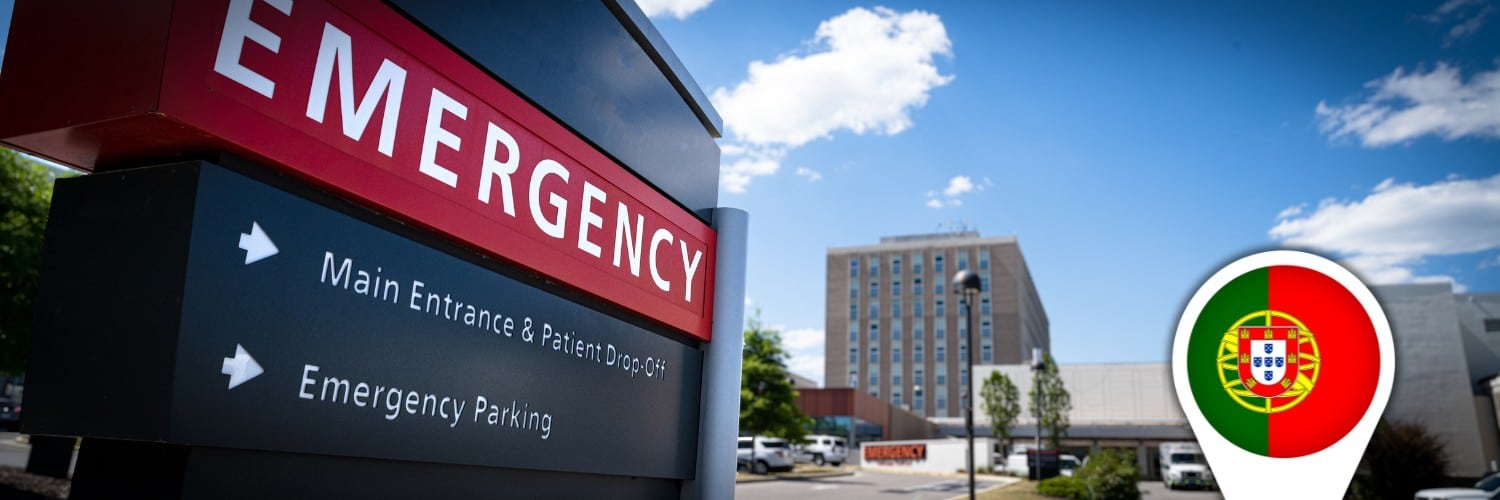Healthcare in Portugal

Portugal offers a high-quality healthcare system that is accessible to both residents and expatriates. The healthcare system is divided into public and private sectors. As an expatriate and non-EU citizen, if you want to use the public system, SNS (Serviço Nacional de Saúde), you must obtain legal residency first – this is typically secured through a visa or residence permit, such as work, student, or family reunification visas (know more about visas here).
The Quality of Care in the Portuguese Healthcare System
Portugal’s healthcare system is known for its high standards in both the public and private sectors. Many healthcare professionals speak English, particularly in private facilities and urban areas.
Public hospitals are well-equipped but may experience longer waiting times compared to private hospitals. Private hospitals and clinics, however, often feature state-of-the-art technology and facilities, providing more immediate and specialized care.
The Public Healthcare System in Portugal

Once Portuguese residency is granted, U.S. citizens can access the country’s public healthcare system. For that, you must register with the local health center (Centro de saúde). The registration process requires presenting a series of documents, including:
- Residence permit,
- Proof of address,
- Portuguese tax number (Número de Identificação Fiscal, NIF).
It’s important to note that you can still access Portuguese hospitals (in case of emergency) even without registration at a local health center.
Portugal Visas & Immigration
We Can Help!
#1 Contact us to get a free quote, or
#2 Schedule a Consultation now.
Understanding these requirements and the services provided by the SNS can help ensure smooth access to the healthcare system and comprehensive medical care for U.S. citizens considering a move to Portugal.
That said, here are the healthcare services offered by the SNS:
- General practitioner (GP) visits
- Specialist consultations
- Hospital care
- Maternity care
- Emergency services
Preventive care, vaccinations, and screenings are also part of the public healthcare offerings.
The costs associated with the SNS are generally low. Services are either free or come with nominal fees, and prescriptions are subsidized, making medications affordable. For instance, G.P. visits might require a small co-payment of around €5-€10.
However, there are some things you should consider when talking about the Portuguese healthcare system:
- Dental care and optical services may not be fully covered under the SNS, necessitating out-of-pocket expenses or private insurance to cover these areas.
- Hospitals usually have long wait times, which applies to both the emergency room and to when you need to request a general or specialty consultation.
- Portugal has a shortage of G.P.s in the public healthcare system, meaning it is getting harder and harder to get assigned a doctor at one of the many local health centers.
- Doctors in Portugal are demanding a better quality of life from the Portuguese government, meaning that many times, the hospital staff is on strike and many units are closed due to a lack of practitioners (specialties like maternity usually are the most affected, especially in rural areas on the main city’s outskirts).
Portugal Visas & Immigration
We Can Help!
#1 Contact us to get a free quote, or
#2 Schedule a Consultation now.
The Private Healthcare System in Portugal
In Portugal, as a U.S. citizen, you also have access to the private sector, which is, in fact, the preferred option for many non-EU citizens due to its shorter waiting times and more personalized services. Private healthcare is widely available in urban areas and includes hospitals, clinics, and specialist services. And even though it can be expensive, it won’t be as expensive as private care in the U.S.
Another important thing to consider as a foreigner coming to Portugal is applying for private health insurance. These vary in coverage and cost, but they offer many options for comprehensive care—most including dental and optical services—and help mitigate the costs of private healthcare.
Regarding costs, for those opting for private healthcare, consultation fees for G.P. visits are, on average, €50-€100, and specialist consultations range from €70-€150. Private health insurance plans can vary widely depending on coverage, but on average, individuals might expect to pay between €400-€1,200 annually for comprehensive insurance, including access to private hospitals.
As a U.S. citizen coming to live in Portugal, it is strongly recommended that you get private health insurance, especially before you are able to secure residency.
Emergency Services

Emergency care in Portugal is available to everyone, including U.S. citizens, regardless of your residency status.
Patients are taken to the nearest hospital in life-threatening situations and receive necessary treatment. However, costs for emergency services may be billed to the patient if they are not covered by the Serviço Nacional de Saúde (SNS) or private insurance.
It’s important to note that the emergency number to call in Portugal is 112.
Portugal Visas & Immigration
We Can Help!
#1 Contact us to get a free quote, or
#2 Schedule a Consultation now.
Helpful Tips for a U.S. Citizen Coming to Live in Portugal

By being prepared and understanding how the Portuguese healthcare system works, you can ensure a much more comfortable living experience in Portugal.
Here are some tips you should have in mind regarding the healthcare in Portugal:
> Learning basic Portuguese can be beneficial, especially when it comes to the public healthcare system. English-speaking doctors and staff are common in private healthcare facilities and larger cities, however having some knowledge of Portuguese can help in everyday situations and reduce potential communication barriers.
> To ensure smooth access to healthcare services, always carry the necessary documents for registering with health centers or during medical appointments. These are:
- Identification,
- Health insurance cards,
- Residence permits (if you have one and are visiting a public healthcare center).
> Pharmacies (farmácias) are widely available and can provide over-the-counter medications, prescriptions, and health advice. Pharmacists often speak English and can assist with minor health concerns, making them a valuable resource for expatriates. Pharmacies also offer extended hours with some being open 24/7.
> (for those with a residency permit) For non-emergency medical advice, consider visiting a local health center where general practitioners can provide consultations and referrals to specialists if needed. It’s advisable to familiarize yourself with the location of the nearest health center and hospital to your residence.
In summary, non-EU citizens can access quality healthcare in Portugal through both public and private systems. Securing residency and appropriate health insurance are critical to ensuring comprehensive medical coverage.
Frequent Questions

1. How is healthcare in Portugal structured?
Healthcare in Portugal is divided into public and private sectors.
2. What is the difference between public and private healthcare?
The public healthcare system is funded by taxes and provides free or low-cost services, while private healthcare requires payment or insurance coverage.
3. Can US citizens access Portugal’s public healthcare system?
Yes, US citizens can access Portugal’s public healthcare system after obtaining legal residency.
Portugal Visas & Immigration
We Can Help!
#1 Contact us to get a free quote, or
#2 Schedule a Consultation now.
4. What documents are required to register with the SNS?
Documents required for SNS registration include a residence permit, proof of address, and a Portuguese tax number.
5. What services are offered by Portugal’s public healthcare system?
The SNS offers general practitioner visits, specialist consultations, hospital care, maternity care, emergency services, and preventive care.
6. Are there any costs associated with using the SNS?
Services in the SNS are either free or come with nominal fees, such as co-payments for GP visits.
7. What are the limitations of Portugal’s public healthcare system?
Limitations include long wait times, especially for non-urgent care, and potential shortages of healthcare professionals in some areas.
8. How does private healthcare compare to the public system?
Private healthcare offers shorter wait times and more personalized services but comes with higher costs.
9. Is private health insurance necessary for US citizens in Portugal?
While not mandatory, private health insurance is advisable for comprehensive coverage, especially for non-emergency care and specialty services.
10. What are the typical costs of private healthcare services?
Costs vary, but consultation fees for GPs range from €50-€100, and specialist consultations can range from €70-€150.
11. How does emergency care work in Portugal for non-residents?
Emergency care is available to everyone, regardless of residency status, and patients are treated at the nearest hospital in life-threatening situations.
12. What is the emergency number in Portugal?
The emergency number in Portugal is 112.
13. How can US citizens prepare for healthcare in Portugal?
US citizens should learn basic Portuguese, carry necessary documents, and familiarize themselves with local healthcare facilities.
14. Do pharmacies in Portugal provide English assistance?
Yes, many pharmacists speak English and can provide assistance with medications and health advice.
15. What should US citizens do for non-emergency medical advice?
Non-emergency advice can be sought from local health centers, where GPs can provide consultations and referrals to specialists.
16. Are there any language barriers in Portuguese healthcare?
While English-speaking staff are common in private facilities, some knowledge of Portuguese can be beneficial, especially in public healthcare settings.
17. Can US citizens use public healthcare without residency?
Residency is typically required to access public healthcare, although emergency care is available to everyone.
18. How can US citizens access specialist care in Portugal?
Specialist care can be accessed through referrals from GPs in the public system or directly in private healthcare.
19. What are some tips for navigating the Portuguese healthcare system?
Tips include carrying necessary documents, learning basic Portuguese, and familiarizing oneself with local facilities and services.
20. Is comprehensive health insurance advisable for US citizens in Portugal?
Yes, comprehensive health insurance helps mitigate costs and ensures access to both public and private healthcare services.
Portugal Visas & Immigration
We Can Help!
#1 Contact us to get a free quote, or
#2 Schedule a Consultation now.

